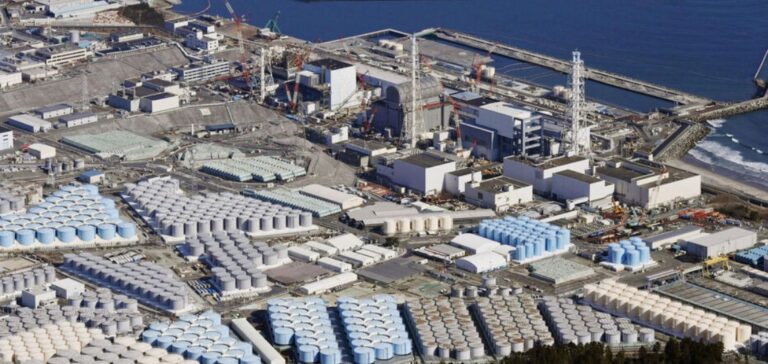The Japanese government will set a date on Tuesday for the start of the discharge into the sea of treated water from the accident-stricken Fukushima nuclear power plant, Minister of Economy, Trade and Industry Yasutoshi Nishimura said on Monday.
Controversy and concern surround Fukushima water discharge project despite Tokyo’s assurances
The project was validated in July by the International Atomic Energy Agency (IAEA), but is causing concern among Japanese fishermen and neighboring countries such as China. The operation, which is expected to last decades, will have no impact on the environment or human health, according to Tokyo.
“We want to convene the relevant ministers tomorrow (Tuesday, Editor’s note) to make a decision on the start of water discharge, after confirming the progress of efforts to ensure safety and remedy the image damage” to the Japanese fishing industry, Mr. Nishimura told a press conference.
Tokyo plans to discharge more than 1.3 million tonnes of water stored at the Fukushima Daiichi power plant, devastated by the tsunami of March 11, 2011 in northeast Japan, into the Pacific Ocean after treatment.
The water was filtered from rain, groundwater or the injections needed to cool the cores of the nuclear reactors that melted down in 2011, but the tritium – a radionuclide that is only dangerous to humans in very high, concentrated doses – could not be eliminated. Tepco, the operator of the Fukushima plant, plans to discharge a maximum of 500,000 liters per day into the ocean, with dilution to reduce the level of radioactivity in the tritiated water to well below national standards for this category.
Fishermen’s “Unchanged Position” despite government reassurances and IAEA endorsement of water discharge
Japanese Prime Minister Fumio Kishida also met Masanobu Sakamoto, representative of the Japanese fishing industry, in Tokyo on Monday, after visiting the Fukushima Daiichi plant on Sunday.
“We asked for understanding in the face of the need to discharge” this water, Mr. Kishida explained after the interview, deeming discharge into the ocean “essential” to progress in dismantling the plant on which “the reconstruction of Fukushima depends”.
“Our position remains unchanged, we are still opposed to the release of water”, Mr. Sakamoto told reporters, assuring the Prime Minister that the fishermen “would maintain this position”, despite the IAEA’s endorsement and the government’s efforts to explain its decision and reassure.
“I told him that scientific safety doesn’t necessarily equate to a sense of safety in society. There is a fear of reputational damage to products” once rejection begins, he added.
Feeling of powerlessness among local fishermen despite a planned compensation fund and impact on exports to China and South Korea
The government has set up a 30 billion yen (190 million euros) compensation fund to help local fishermen cope with such damage. In Fukushima prefecture, however, some residents were overcome by a feeling of helplessness.
“I don’t want the water to be thrown away, but I think most of us have given up,” a 70-year-old local amateur fisherman who declined to be identified told AFP.
“No matter what we say, our appeals fall on deaf ears in power”, said Isokazu Kudo, owner of a small fishing cooperative in Fukushima, telling a local TV station that many in the industry were “rather resigned”.
China – to which a quarter of all Japanese seafood was exported last year – decided in July to ban food imports from ten Japanese counties, including Fukushima, citing safety concerns. The South Korean population is also concerned, although the Seoul government, which has recently warmed relations with Tokyo, has not objected to the Japanese plan.






















